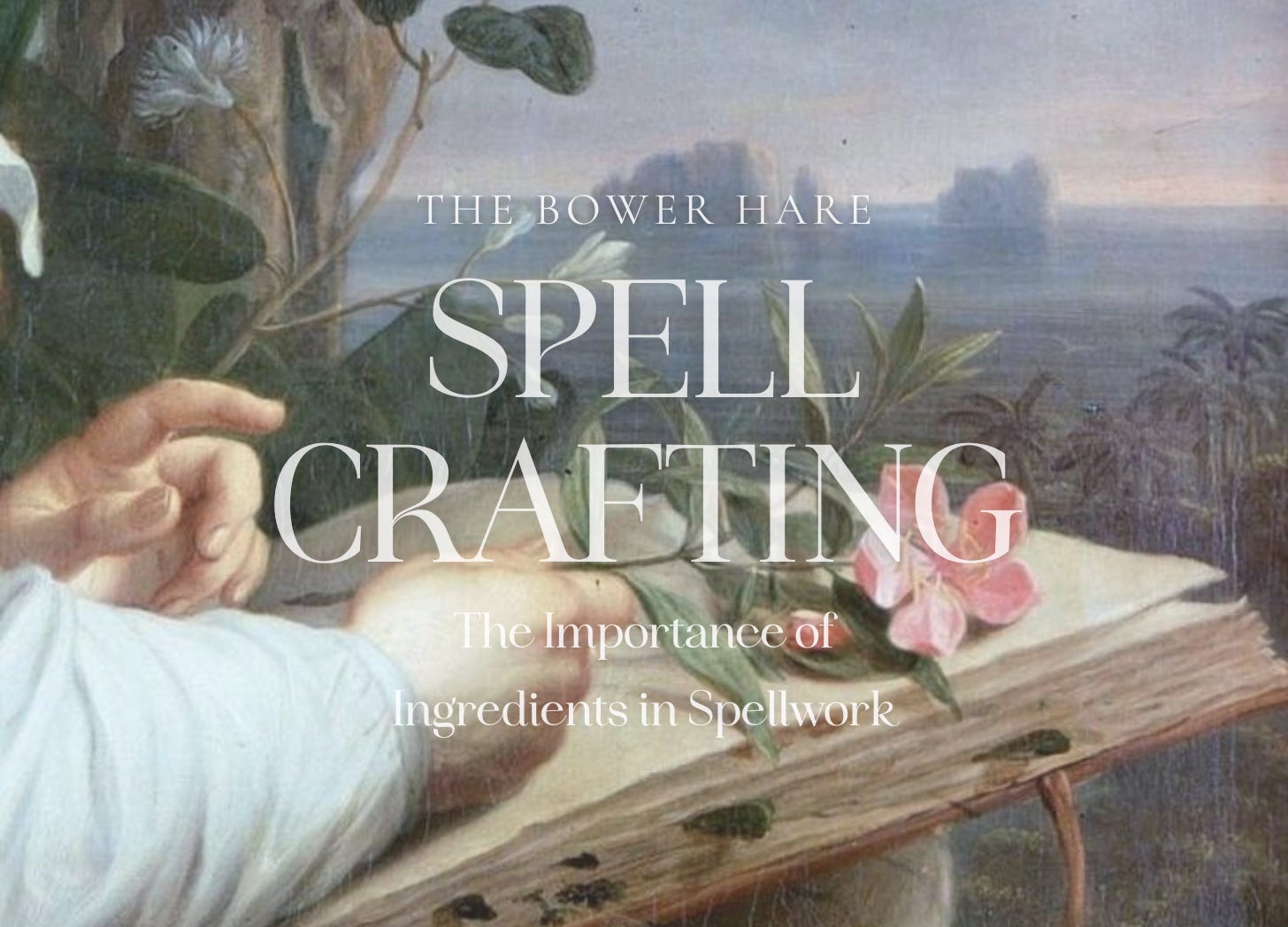Spell Crafting
The Importance of Ingredients in Spellwork
As a witch you are a chef, a healer, an alchemist and a scholar. You are expected to know a myriad of different things, subjects, tools, skills, history, traditions and ingredients. It is a daunting prospect, being entrusted with this knowledge, especially when it comes to spellwork. Some spells are contained to bottles and bags, some are burned, others poured into baths or rubbed onto the skin in a salve. Some are injested, enjoyed at mealtimes or sipped whilst sat in the garden under a full moon, some are rubbed into the apples of our cheeks or swiped across our lips. Spellwork is the most natural of pursuits and working with nature on a deeper level can unlock a huge amount of potential.
So what makes a spell so powerful? Intention has a lot to do with it, but is only a small part. Timing? Of course, different phases of the moon come to mind, or particular days of the week... what about incantations? They too can be useful, but the most important part of any spell are the ingredients used.
If you enjoy cooking you'll know that a recipe tastes better and has more success if the ingredients used are fresh and of good quality. An organic potato, wrapped in tinfoil and roasted on an open fire with black garlic, grass fed butter and home grown chopped chives (flowers included) tastes much better than a frozen potato cooked in a microwave.
I understand that on some occassions you want a microwaved potato, on those low energy days when you just don't want to be fancy or you cannot afford the extra ingredients or the extra steps involved. When it comes to spells there are low energy options, but when conjuring or manifesting important or big things, you should be having a long hard think about what's going in that cauldron.
An ingredient can also be marinated. You can start marinading your herbs with intentions from the moment you plant them, or when you collect and store them. This further adds to their potency as they are already energetically 'charged' when they are added to the spell or used during the ritual. It seems like a lot of work, to think about a spell months in advance when you plant a windowsill herb garden, to know what intentions to whisper into the soil with the seedlings, but it is all worth it. Learning about the needs of plants on a physical level not only levels up your craft, but it makes you a better practitioner, gardener and nature-lover and it instils a quiet confidence in yourself that only comes with knowing a lot about a subject.
A spell is only as good as the ingredients it consists of, write your shopping list carefully...
I admit that in the past, towards the start of my witchcraft journey, I have asked Google to tell me the magickal properties of a plant or other magickal ingredient. I'm sure you too have seen what the results consist of; hastily thrown together Pinterest infographics, bad websites mixed with good ones, and very occasionally a decent blog post... the majority of them however are quite vague and say things like
'This herb is good for protection...'
Is that it? Is that all we're supposed to know? What kind of protection? A life vest protects us in the sea but not when we jump out of a plane. Why has this herb been deemed a protector? Is it thanks to its properties? The shape of its leaves? Where it grows? Its folklore?
Search results like these worked for me at the start of my practice, when I was cautious and didn't have the confidence to do more complicated spells and rituals. It was only when my confidence grew that I realised that there was so much untapped magickal knowledge in the scientific aspect of plants. Ironically, magick can be found in scientific facts and mundane observations.
It might seem daunting, to not only have to learn the magickal properties of plants but also horticulture. Don't worry, the power in the knowledge you'll unlock far outweighs the research you will undertake, and there is no rush. Witchcraft is a lifelong lesson in which you learn things at a slow and steady pace, and you'll be amazed at what information you retain when you give yourself the time and space to pursue it. Learning horticulture, how to grow and take care of and make more plants, is invaluable as a witch, our focus is primarily on nature and getting to know her, and by knowing how to take care of her we are greatly rewarded when it comes to creating our spells and rituals.
So, why is Rosemary good for protection?...
Keep reading with a 7-day free trial
Subscribe to The Bower Hare to keep reading this post and get 7 days of free access to the full post archives.



